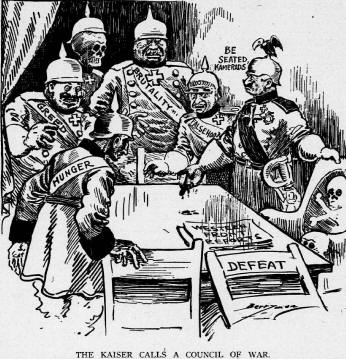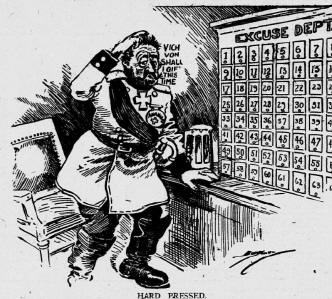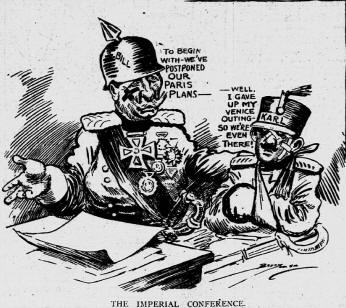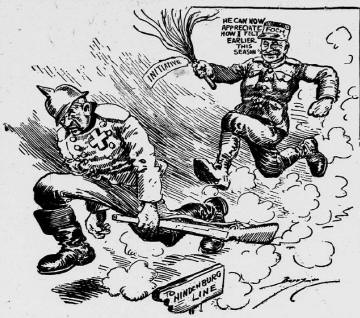September 1918
"We got the Huns on the run"
August 2
Allies Attack German Flanks
 American and French troops have begun flanking attacks on German positions, which if successful, will compel a German retirement over a wide sector of the Western Front. Although the announced purpose of the attack was to straighten the line,
this is secondary to the goal of outflanking the Germans. The continued advance by the Allies would force the Germans to fall back to escape being cut off from the rear.
American and French troops have begun flanking attacks on German positions, which if successful, will compel a German retirement over a wide sector of the Western Front. Although the announced purpose of the attack was to straighten the line,
this is secondary to the goal of outflanking the Germans. The continued advance by the Allies would force the Germans to fall back to escape being cut off from the rear.
As long as they remain south of a line running between Rheims and Soissons, the Germans will be subject to violent bombardment from the Allied guns, which can demoralize their communication. There are deep indentations at two vital points in the German line, which offer good jumping-off places for the Americans and the French.
This morning, the whole American line moved forward, pressing hard against the sides of the German salient. These gains were made almost without resistance. Hammered as they have been for days, the Germans withdrew during the night. When the Americans, supported by French, advanced, they did not encounter the usual machine gun
fire.
In open order the men plowed their way through the heavy, rain-soaked fields for almost a mile. The front spanned about five miles and penetrated three miles from the former line. The Allies are now within five miles of Bazoches, an important German railroad center on the Vesle River.
Simultaneously the French and British attacked on the Western side of the Marne salient and penetrated to a maximum depth of three miles. The advance by the Allies along the western side of the salient is extremely important - possibly the most important task the Allies have accomplished since the Germans retired from the
Marne.
The importance of the victory is that the new Allied positions hold the flanks and rear of the entire western gate through which the Germans had been retiring. As a result, the Germans will not be able to retire in an orderly, leisurely way and they probably will have to go beyond the river Vesle in their retreat. The
situation is extraordinary, commonly considered the turning point of the summer campaign, and possibly of the whole war.
August 9
Allies Continue To Press Germans Hard
 The Allies continued their advance towards Vesle. Many prisoners were taken by the French at Soissons, which was occupied one hour after the Germans had been driven from the suburbs. It seems the enemy did not expect to be chased from
Soissons. There was no indication that preparations had been made for retirement and no fires were discovered.
The Allies continued their advance towards Vesle. Many prisoners were taken by the French at Soissons, which was occupied one hour after the Germans had been driven from the suburbs. It seems the enemy did not expect to be chased from
Soissons. There was no indication that preparations had been made for retirement and no fires were discovered.
This week’s splendid success is but a link in the chain of victories that have followed one after another since General Foch launched his counteroffensive on July 18. Rarely in the history of war has a plan followed with such precise regularity. Military opinion is lost in admiration of the splendid genius which conceived the
plan, and of the masterly way in which it has been carried out.
The consequence of this week’s victories cannot yet be gauged, but the notion that they will be far-reaching already appears certain to the commentators. The enemy cannot hold the Vesle line, but must re-cross the Aisne. By recapturing Soissons, the Allies will able to debouch on both sides of the river and take the enemy in
the rear.
The enemy appears to be perfectly aware of the necessity of getting out quickly in order to avoid unpleasant consequences. In accordance with the usual practice, the enemy has set fire to the abandoned bases and villages. The rising smoke shows that the enemy knows he is no longer safe in those places.
The German retreat began Friday morning. Little by little the retreat quickened. The fall of Soissons, which the Germans were obligated to evacuate, irrevocably decided the fate of the battle. It was the pivot of the whole German line. Once the Germans finish their retirement, the situation will revert to where it was in
September 1914.
Notwithstanding the difficulties confronting them, the Allies are bringing up their guns almost as fast as the Germans are redrawing theirs. All the roads over which the Germans are retiring are subject to heavy bombardments.
The retreat of the Germans has been carried out with skill and, up until Thursday, it seemed to be orderly, if not delivered. Ever since that time there have been no reports of large captures of prisoners, and there has been no mention of captured Cannon. It is probable, therefore, that the German retirement has been a
successful operation. The loss to the Germans in munitions and materials, however, will be very heavy.
Wedge Driven Into Enemy Territory
German lines on the Picardy front, south of the Somme, have been badly broken by the savage thrust of the British and French Armies. A wedge has been driven deep into enemy territory to a depth of eleven miles and the British are only a mile away from the Roye Railway, which forms the chief artery of supplies for the German
troops fighting in the Montdidier sector of the front. The results of this attack, as they appear, have eclipsed those obtained by the Germans on the first day of any of their terrific offensives of the past spring and summer.
So far, the progress south of the Somme shows that the Allies are advancing without serious opposition. On the north bank of the stream the Germans have held their lines strongly, but have lost their stronghold there. The French, further to the south, have had their advances stalled at numerous points.
From the dispatches on the battlefield it now appears that the Allies attacked the Germans with little artillery preparation. Armored tanks in great numbers tare through the German front first, infantry masses follow, and then through the gaps in the enemy lines the cavalry and armored motor cars sweep into the back areas,
surprising German detachments and throwing the whole defensive organization of the enemy into chaos.
The German reverses along the Somme have hardly been reported when dispatches begin to tell of German retirement in the Flanders sector. Its larger aspect, the success of the Allies south of the Somme, continues to be a very serious threat to the German line, especially to the south. The advance has not weakened the German
position northward towards the Arres so far, but the enemy finds itself in an embarrassing position around Montdidier, and southeast of there.
Further advance of the Allies in Picardy would outflank the whole German line and possibly cause an immediate retreat to positions which could be linked up with the Aisce line.
Bolsheviks And Czechs Clash
Bolshevik activities, the Czechoslovakian advance and the cooperation of the Allies, continue to form topics of consideration and discussion in military and diplomatic circles.
Plans are being prosecuted with speed and vigor for the participation of American and Japanese forces, to support the Czechoslovakian troops advancing eastward toward Siberia. The Czechoslovakian Army is moving through the Ukraine to Viadivostock and the Pacific, where the Allies will carry them to the Western Front.
The French high commission has publicized a telegram from Berlin describing the growing anxiety of the Germans over the lack of success of the Bolsheviks in their campaign against the Czechoslovakians.
In this movement, Berlin feels a burst of enthusiasm that makes it particularly dangerous. The Russian people are idealists who are animated with conviction for fighting foreign nationalists. This explains the force of the attraction that they are exerting. The Cossacks have rallied around the Czechoslovakians. The social
revolutionists support them by sowing trouble in conquered regions. Japan is furnishing them with arms and ammunition, and finally, England and America are helping them by intervening in the north of Russia.
But it is not only on the Russian side that the real danger of the Czechoslovakian movement exists. They cannot fail to make a profound impression in Austria; for the people of the Double Monarchy are following their movements with feverish expectations at the successes of their brothers, and in doing so, undermining the
Austrian Government.
At the time the peace treaty was signed by the Bolshevik government, the Czechoslovakian Army of 50,000 men was in the Ukraine fighting for the Russians. The Emperor of Austria sent a special envoy with the promise that if the Czechs disarm themselves they would receive amnesty and their lands would be made free. The answer
was that they would have no dealing with the Austrian Emperor, and began their retreat toward the Pacific.
August 16
German Somme Salient Collapsing
On Saturday, the Allies captured the important town of Montdidier, which was approximately at the apex of the German salient south of the Somme. The German Army of Gen. von Hutier was retreating with haste, with much material being left behind. The number of prisoners taken for the Germans in the fighting in Picardy has
increased to 24,000.
Meanwhile, the French have driven the Germans before them for an important gain East of Montdidier in Picardy. That city, which was the apex of a German salient that has now been wiped out, fell to the French at midday Saturday. Before nightfall, victorious French forces carried the battle line onward to an average depth of
six miles on a front of approximately twenty miles.
Crushed by the impact of the British, French and American offensive, German forces are streaming back across the Somme River. So far as can be determined, the enemy is in full retreat all along the front against which the Allies flung themselves on Thursday morning.
The Germans are in a serious position east of Montdidier. Allied airmen have seen roads filled with German motor lorries and have been active in bombing these lines of transportation. The bridges of the Somme River are under fire and many have been destroyed. This will throw new complications in the German High Command’s
efforts of extracting shattered Armies from the field which they have been defeated.
Trouble Galore In Russia
Germany is having trouble galore in Russia. She must soon withdraw troops from the Western Front or lose some of the territory wrested from the helpless Russians through the Brest-Litovsk Treaty. Day after day telegrams from distant parts of Russia show a widespread antagonism towards Germany. As Russia does not have an
organized army, it will take many hundreds of thousands of German soldiers to keep communications open to retrieve needed supplies.
German press comments are gloomy. They seem to recognize that Germany got more than she bargained for in Russia, and that the Bolshevik government, which negotiated the Brest-Litovsk treaty, cannot command the confidence or support of the Russian people.
Every report received here indicates that the power of the Soviets is declining rapidly and that Lenin and Trotsky will sooner represent no one but themselves. In the meantime, counter revolutionary movements are a stir throughout Russia, and Germany is not getting the food out of the Ukraine that she so eagerly anticipated a
year ago. Bitterness against the Germans is indescribable in this region, and the possible arrival of the Czechoslovakian troops with supplies from the Allies may yet make the Ukraine an Allied outpost.
Officials describe the disorders entirely to the misguided German policy, which encouraged the Bolsheviks and opened diplomatic relations with the Lenin Trotsky government before determining whether the latter could command popular support or dominate classes. The Germans, therefore, have reaped all the disadvantages of the
Bolshevik rule. The widespread discontent, which has grown up in the Russian masses, now is as much aimed at the Trotsky agitation as the foreign invaders.
Affairs are turning in favor of the Allies in Russia because of the mistakes of the Germans as well as the growing recognition of the fact that the Allied cause represents democracy. Therefore, it is urged that the Allied expedition into Siberia proceeds cautiously so that no step may be taken which may forfeit the sympathy,
which the Allied powers are now enjoying.
Russian Republic In Danger, Say Soviets
The Soviet government has issued a proclamation declaring that the Russian Republic is in danger. The Petrograd Soviet has removed to Kronstadt owing to the insecurity of the city. Bands of armed peasants are reported marching on Petrograd from surrounding districts. They declare they are starving and the red guards have
stolen all their food. Dissatisfaction with the Soviets is said to prevail everywhere throughout Russia.
Soviet troops have begun to evacuate Moscow, and Premier Lennon and War Minister Trotsky have fled to the naval base at Kronstadt. All government departments are being removed there also.
The flight of Lenin and Trotsky were caused by threats by the social revolutionists of the left to begin a reign of terror there. Whether or not the Soviet troops were forced to depart from Moscow is not clear, but the loss of the city to the Soviet government will undoubtedly be a serious blow to their cause.
Moscow, the ancient capital of Russia, was made the Soviet capital in March. The government fled there from Petrograd, towards which the German troops were marching. It has been reported within the last few days that the Germans have renewed their march towards Moscow, and are only 50 miles away.
The great masses of Russians are also just learning of recent victories of the Allies in France. As these facts become known there is a revival of anti-German spirit among the Russians, and, according to reports, they are flocking to the ranks of the Czechoslovakians in large numbers.
August 23
Teutonic Monarchs Meet In War Parley
 Germany has made concessions to Austria on the Polish question in consequence of the strong stand taken by Emperor Charles and the Austro-Hungarian government.
Germany has made concessions to Austria on the Polish question in consequence of the strong stand taken by Emperor Charles and the Austro-Hungarian government.
It is possible there will be no personal union of the Crowns of Poland and Austria, but the King of Poland is certain to be an Austrian Archduke, according to a correspondent who added that the discussion at German main headquarters has the following task: the Germans demanded that the Austrians send 10 to 15 divisions of
picked troops to the Western Front, containing themselves to the defensive on the Italian Front.
To counter Germany’s demands, Emperor Charles and his advisors demanded that Germany make further declarations guaranteeing the evacuation, restoration and indemnity of Belgium, making a full movement toward peace, and that the Polish question be solved in a manner favorable to Austrian wishes.
The advisors of the Austrian Emperor emphasized that the opposition of Austrian military and public opinion to the transfer of troops to the Western Front was universal. This opposition could be overcome only if the government was assured Polish support, which could be obtained by securing Germany concessions on the account of
Poland, and if the public could be shown the German government had been induced in the direction of another strong effort to obtain peace. Short of this, Austria would not send troops to the Western Front.
Allies Break German Lines At Picardy
Launching what may be described as an extensive local attack on Sunday evening, the French broke through the German positions along the vital sector connecting the Marne and Picardy battlefields. This attack was over a front of approximately nine miles.
Up until this attack, the situation along the Picardy seemed to be approaching a deadlock, indicating a return to the old trench warfare of the first two years of the war. An attack in the sector between the Aisne and Oise has been expected. This line is vital to the German positions on each side of it. If it should be broken,
the whole German defensive scheme would be thrown out of joint.
While the assaulted front was short compared to those on the Marne and Picardy drives, the success attained by the French makes it possible for Marshall Foch to break the enemy's resistance by a flank attack instead of a direct assault against the strong positions held by the Germans.
It is believed that the Germans are weaker on the Western Front than the Allies claim. It is stated that all leave from the front has reduced by one half, that men are sent to the front from the hospitals before properly fit, and letters from the front have been discontinued. Deserters are being sent to the front from
punishment camps. Wounded horses are being hurried west with bandages still in place. The correspondent added that it is reported the Germans have stolen food parcels sent to French prisoners in order to feed manual laborers who are on strike because of inadequate food.
August 30
Allies Have Germans In Hand
 "The tide has turned, at last, things are coming our way" are the words of the political and military Allied leaders and American soldiers during the recent fighting. The Germans’ last hopes of winning the war, reaching Paris or the Channel
ports, have been ended by the success of stunning blows delivered by the Allies since July 13.
"The tide has turned, at last, things are coming our way" are the words of the political and military Allied leaders and American soldiers during the recent fighting. The Germans’ last hopes of winning the war, reaching Paris or the Channel
ports, have been ended by the success of stunning blows delivered by the Allies since July 13.
Now the Germans find themselves facing the choice between two alternatives. They must either go decisively on the defensive along the front, as they were in 1916 and 1917, or withdraw to a shorter line, thus freeing more troops. The latter course may enable them to make a short, fierce attack this fall and gain enough ground
to spur the flagging spirits at home through another winter, but it carries no hope of accomplishing anything decisive.
The much-heralded plans of the Germans to win a complete victory on a grand scale along the Western Front this year, before the American troops can make themselves felt, must be given up.
The German offensive spirit is waning noticeably. The morale is low, especially among the second-rate regiments. Even picked troops, while having plenty of fight left in them, have lost much of their arrogant boastfulness and confidence in themselves and in their leaders.
Still fighting a losing battle, the Germans are unquestionably becoming disorganized and rattled. Officers who have been taken prisoners and have mentioned recent reverses, especially the defeat, which is now imminent that Germany is willing to give anything for peace. These statements show the way the German Army views the
war as they now face almost certain defeat.
There can be no doubt that prior to the Allied attack the Germans were contemplating a retirement, but they intended to take their time. There is no mistaking the fact that at critical points, the whole German resistance shows signs of cracking. Military experts believe that the Hindenburg Line will be in Allied hands by
October 1.
What happens now depends upon two things. The extent to which the German center can be harried and demoralized before it gets to the Hindenburg Line, and the ability of the Allies to strike on the flanks and thus abolish the German line in France.
Sometime within the next few days, probably by the end of next week, the Germans will be back at the Hindenburg Line; and the Allies will have before them a system of entrenchments that the Germans have been upgrading for the past two years, and which they can safely hide behind.
Read past editions of News Reports From the Front
Have a newspaper clipping on a event that took place in Emmitsburg?
If so, send it to us at history@emmitsburg.net